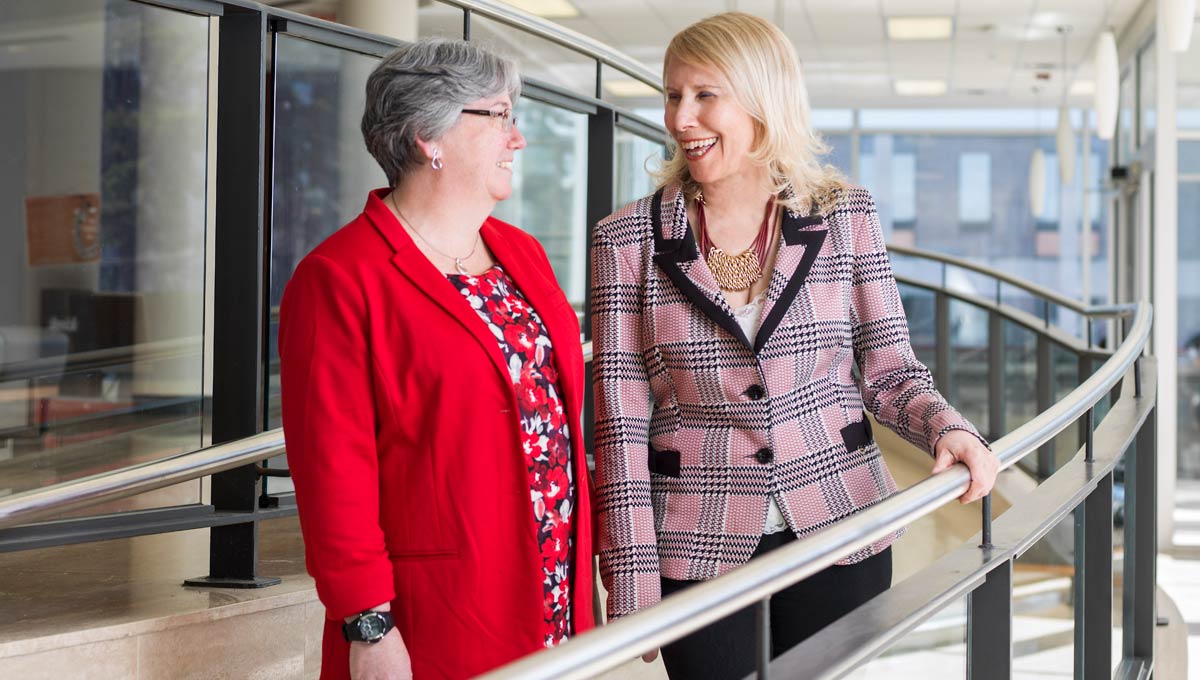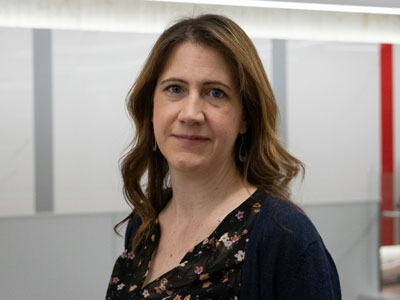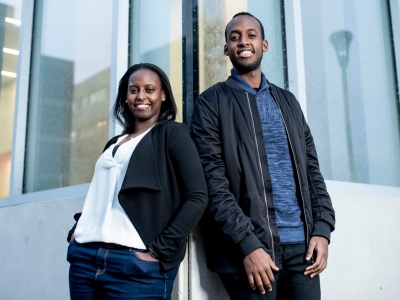By Dan Rubinstein
Photos by Chris Roussakis & Justin Tang
In 1992, when Carleton University established the Centre for Research and Education on Women and Work (CREWW) as a vehicle for delivering a new management development program for women at work, the gender-specific offering generated some controversy.
Local TV stations covered the launch of the non-credit certificate and “created a little bit of a media storm for a few days,” recalls CREWW founding director Lorraine Dyke, a professor of management and strategy and associate dean at the Sprott School of Business.
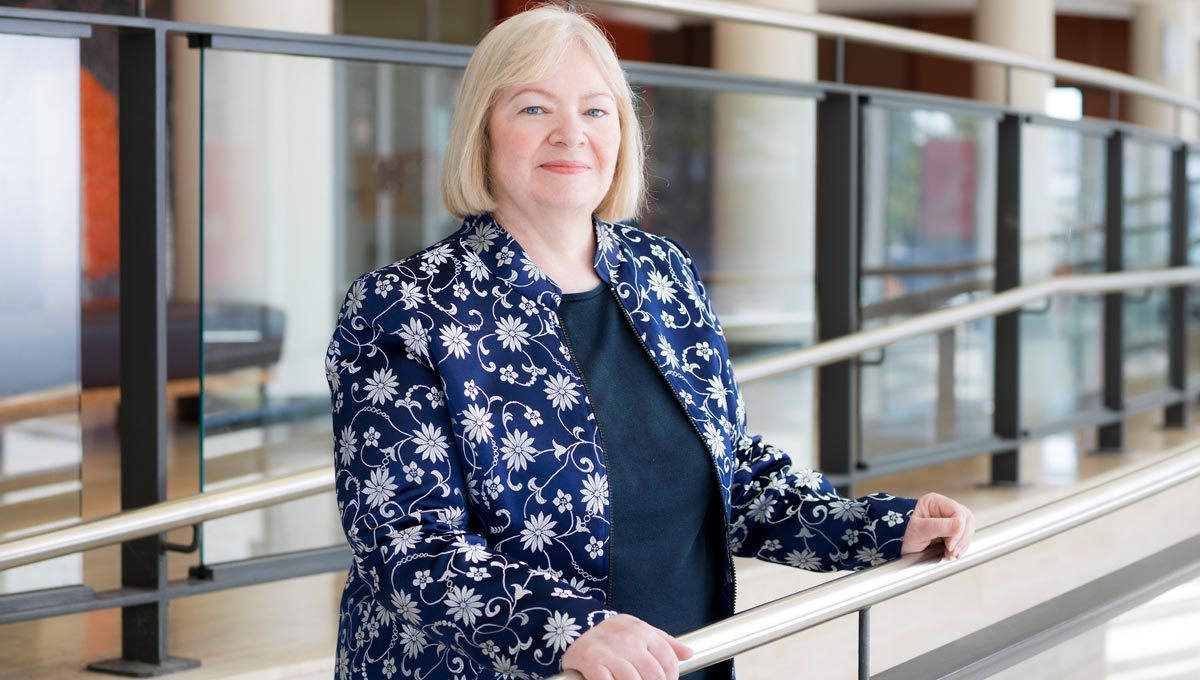
CREWW founding director Lorraine Dyke, a professor of management<br /> and strategy and associate dean at the Sprott School of Business.
CREWW had space for 25 students that first year but was deluged with 100 applications. It was just three years after the shooting deaths of 14 women at Montreal’s École Polytechnique, and gender equity was a very salient issue in academia, business and STEM (science, technology, engineering and mathematics) fields.
Dyke had only arrived at Carleton in 1988, drawn in part by the high percentage of female business professors, and saw that the university was well positioned to start a management program for women modelled after a successful course at the University of New Brunswick.
“If women aren’t making it into leadership roles, that affects the opportunities of women throughout society more generally,” says Dyke, who served as CREWW’s director for almost 20 years.
“There is also a business case for gender diversity,” she adds. “Women bring different perspectives to the boardroom table. They’re 50 per cent of the marketplace. You need their insight when developing products and services.”
Although tremendous progress toward equality in the workplace has been made in Canada over the past quarter-century — Prime Minister Justin Trudeau famously quipped that his first federal cabinet was gender balanced “because it’s 2015” — the “pink ceiling” that limits the number of women who ascend into upper management remains a significant barrier.
And so, amid CREWW’s 25th anniversary celebrations, a milestone that includes a merger with Carleton’s Centre for Women in Politics and Public Leadership, Dyke and her colleagues know there are still many challenges on the road ahead.
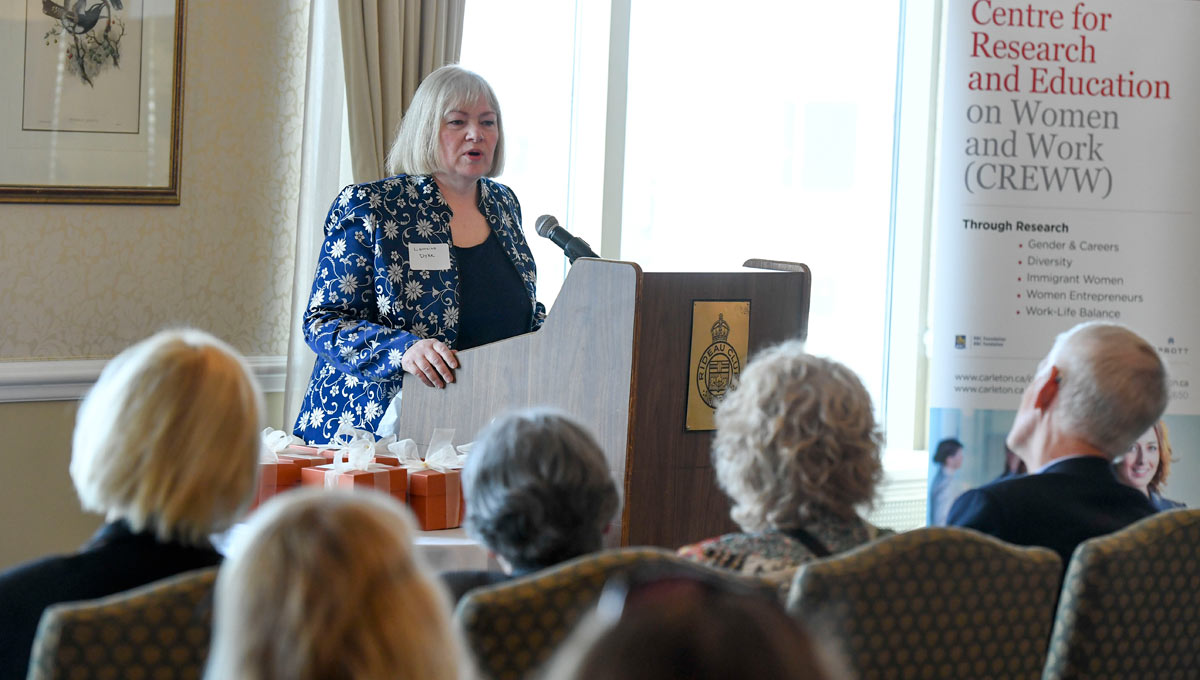
Women at Work Face Many Challenges Ahead
CREWW’s initial management development program has evolved over the years from its start as an intensive 30-day course and endures as the centre’s flagship Management Certificate for Women (MCW), a seven-month program that brings participants onto campus for a pair of consecutive days — a Friday and Saturday — from September through March.
But CREWW’s focus now includes research as well. The centre has conducted a number of major research projects with findings that are accessible to the public. These studies have looked at career issues faced by women in the federal public service, career issues in the high-tech sector, work values and retention over the life cycle and other significant subjects.
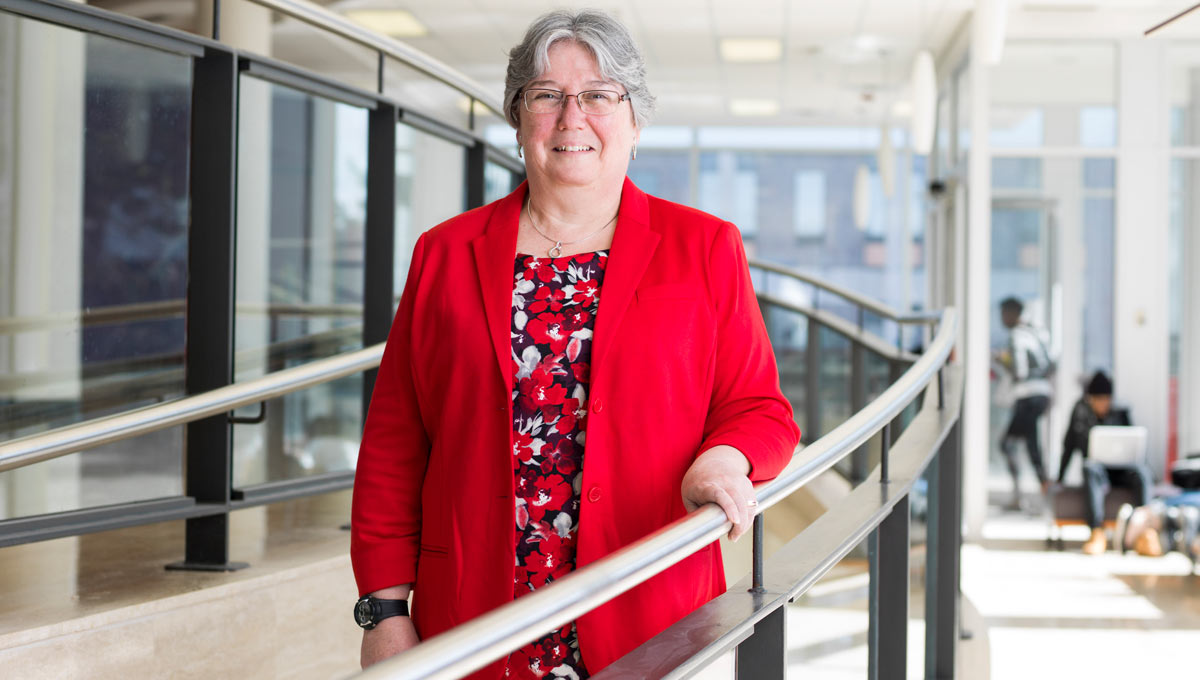
Sprott Accounting Prof. Merridee Bujaki, CREWW’s director since 2013, says that<br /> historically, research has shown that women sometimes self-censor in mixed-sex classes.
CREWW also does outreach work through events like its Women in Management Speaker Series, annual spring and fall lectures on topics such as sexual harassment, female entrepreneurship and pay equity.
Although there is a place for courses and events open to any gender, Sprott Accounting Prof. Merridee Bujaki, CREWW’s director since 2013, says that historically, research has shown that women sometimes self-censor in mixed-sex classes.
“In a safe space, women’s voices aren’t muted,” says Bujaki.
“They can express what it means to be a woman in the workplace, what it means when your contributions are deemed less valuable, to be subject to harassment. Women gain self-confidence in a supportive environment and realize they have a lot to offer.
“What I hope they go away with,” she continues, “is a sense that they can and should be deliberate in both their management and leadership.”
Women who graduate go back to their employers — whether in the public, private or non-profit sector — not only with the skills to advance their own careers, but also to help their organizations. “That ripples out and has a wide impact,” says Bujaki. “It’s not just about advancing the skills of individuals.”
Both women and men can be somewhat androgynous in their leadership styles, she adds, but women tend to lead in a way that’s more inclusive.
“It’s not just about the numbers. They want to develop everybody on their team. Sometimes, it’s a matter of choosing the right style for the right circumstance. All styles have advantages and disadvantages. Deferring to a team can lead to a woman not receiving credit; sometimes you need to proclaim your expertise and take credit.
“Once you see yourself as a leader, you begin to act as a leader. You seek challenging and risky assignments. You reach out, champion causes and negotiate for resources for the things that you need.”
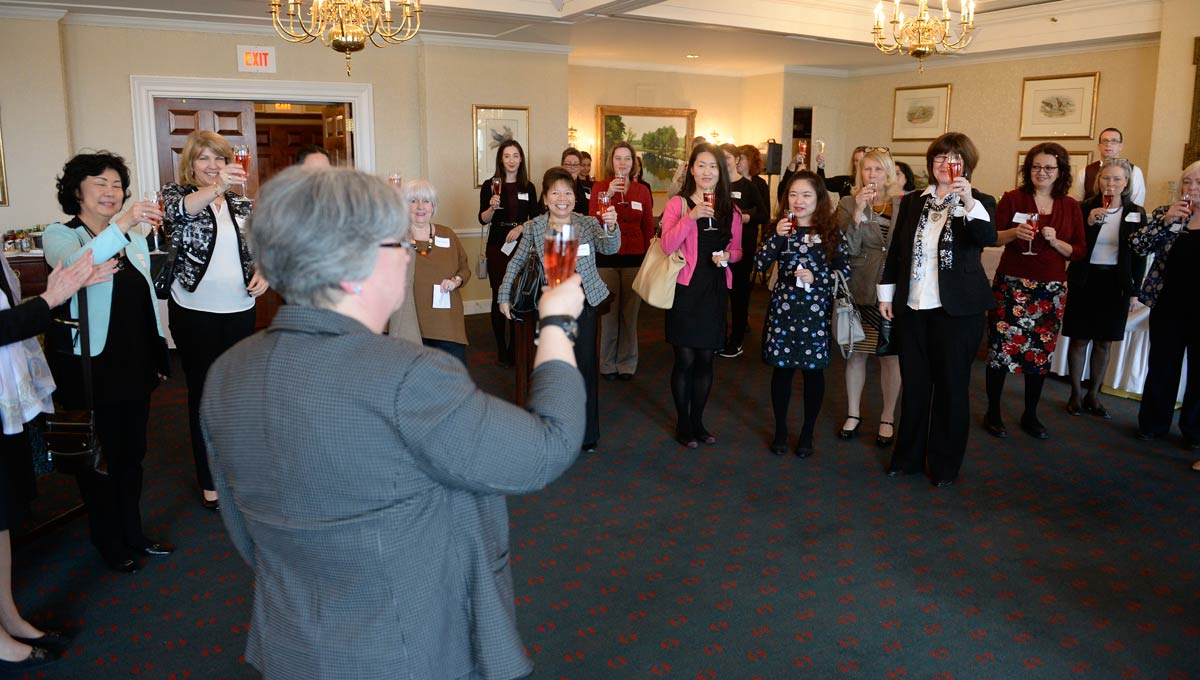
Giving Women a Career Boost
Gillian Szollos, a health promoter and family support worker at Ottawa’s Carlington Community Health Centre and a partner in her husband’s stonemasonry business, enrolled in the MCW program to give both of her careers a boost.
The schedule fit her life as a busy professional, mother and daughter to elderly parents. And beyond elements such as the MCW’s financial management component — which initially attracted her to the program — she gained valuable communication skills.
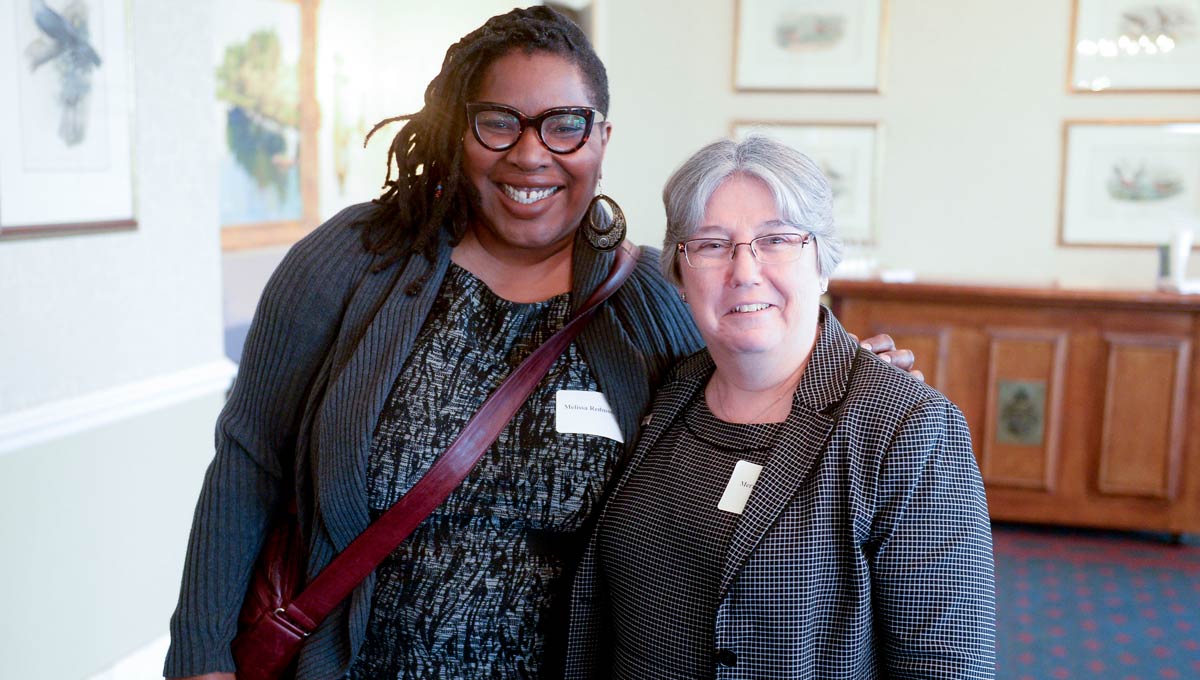
Melissa Redmon, assistant professor in the School of Social Work, poses<br /> with Professor Bujaki at the CREWW 25th Anniversary Celebration
“I’m passionate about community development and capacity building, and about building collaborative partnerships to better the health of our community,” she says.
“I think I’m at a place now where my passions and my management skills are equally strong. I am ready for a leadership role which will allow me to use these strengths for the benefit of the community.”
Tara Sutorius, another recent MCW graduate, has embraced more responsibility in her position as manager with the Canadian Air Transport Security Authority since finishing the program a year ago. She has also started a life coaching business that she had been considering for years.
Sutorius, whose undergraduate degree is from Carleton, signed up to formalize the skills she had learned in nearly 20 years with the federal government. She found the units on accounting and negotiating very valuable, and, having worked mostly alongside male executives throughout her career, she liked being surrounded by female leaders.
“It’s a real confidence-builder,” she says about the MCW program. “There’s nothing out there that’s packaged quite like it. I don’t know if I would’ve got my own business off the ground if it hadn’t been for what I learned. It gave me that confidence to say, ‘I can do this.’”
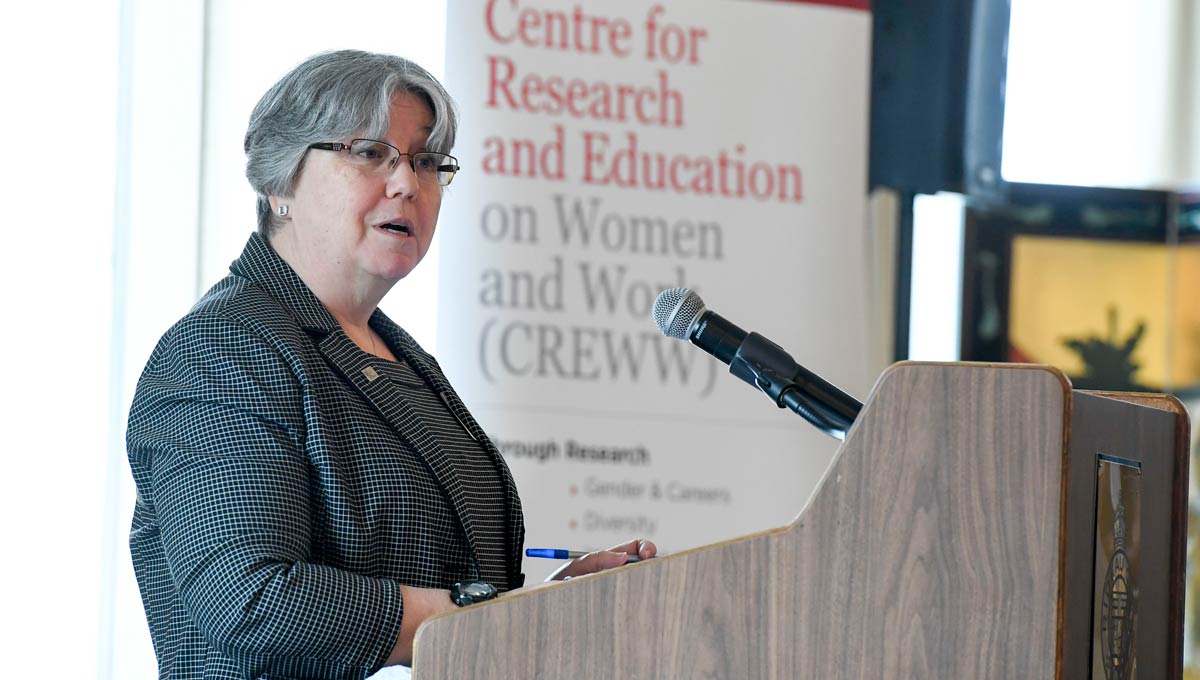
Supporting Economic Development
In 2008, Roslyn Bern, president of the philanthropic Leacross Foundation and a former board member with the Canadian Women’s Foundation, was looking for opportunities to support economic development initiatives for women.
She met Lorraine Dyke, learned about CREWW, and established a bursary program to support women from the non-profit sector, female entrepreneurs and women at work in under-represented careers who want to enroll in the MCW.
“To move up in management, women need to know they have skills and leadership abilities,” says Bern.
“There aren’t a lot of these types of courses offered, and the ones that exist tend to be quite expensive.”
Gender discrimination is often subtle in Canada, she says. Women remain in the same organization for years without moving up, for instance, or a board of directors will have one token female member.
The Leacross bursaries have helped dozens of women over the years. “For some women, it provided an opportunity to question whether they wanted to stay at the same place of business,” says Bern, “or go elsewhere to move up the ranks.
“I don’t think we’re going to solve this in my lifetime. We’re just trying to keep making things a little bit better.”
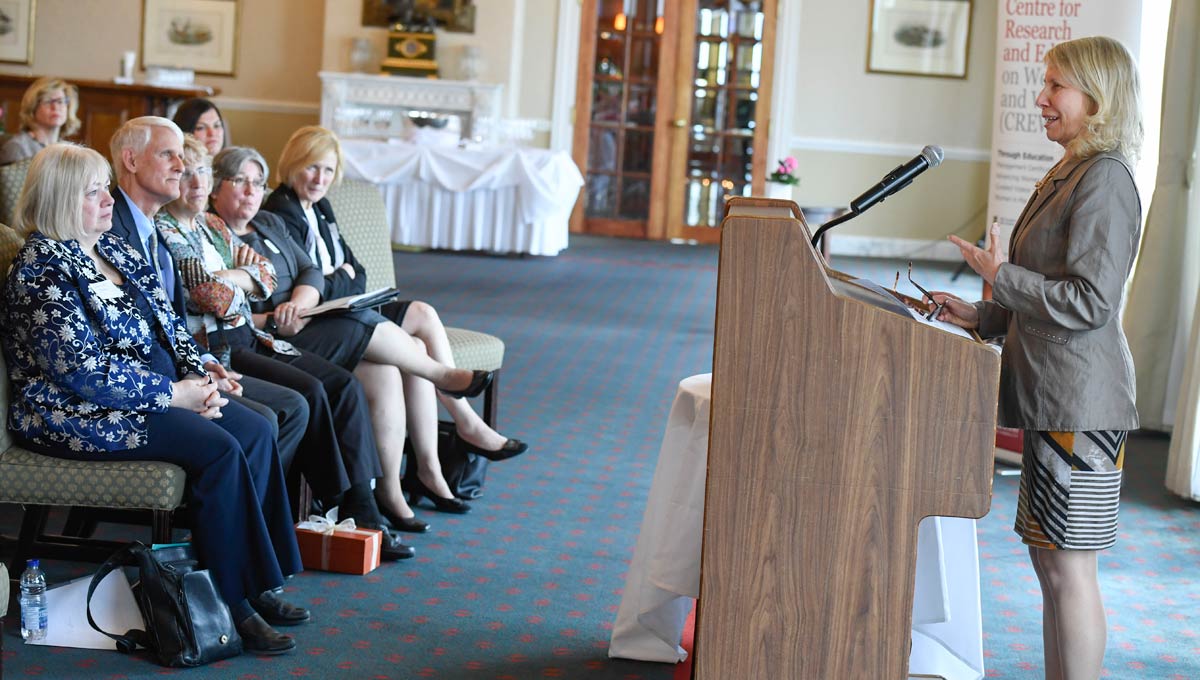
Women at Work in
Politics and Leadership
CREWW’s merger with Carleton’s Centre for Women in Politics and Public Leadership (CWPPL), which was officially announced at the 25th anniversary event at the Rideau Club in downtown Ottawa on May 9, will allow the centres to share resources and more effectively advance female leadership.
They will operate under the CREWW banner and a new tag line will be added (CREWW – Advancing Women in Leadership) to reflect the CWPPL’s focus on women’s leadership.
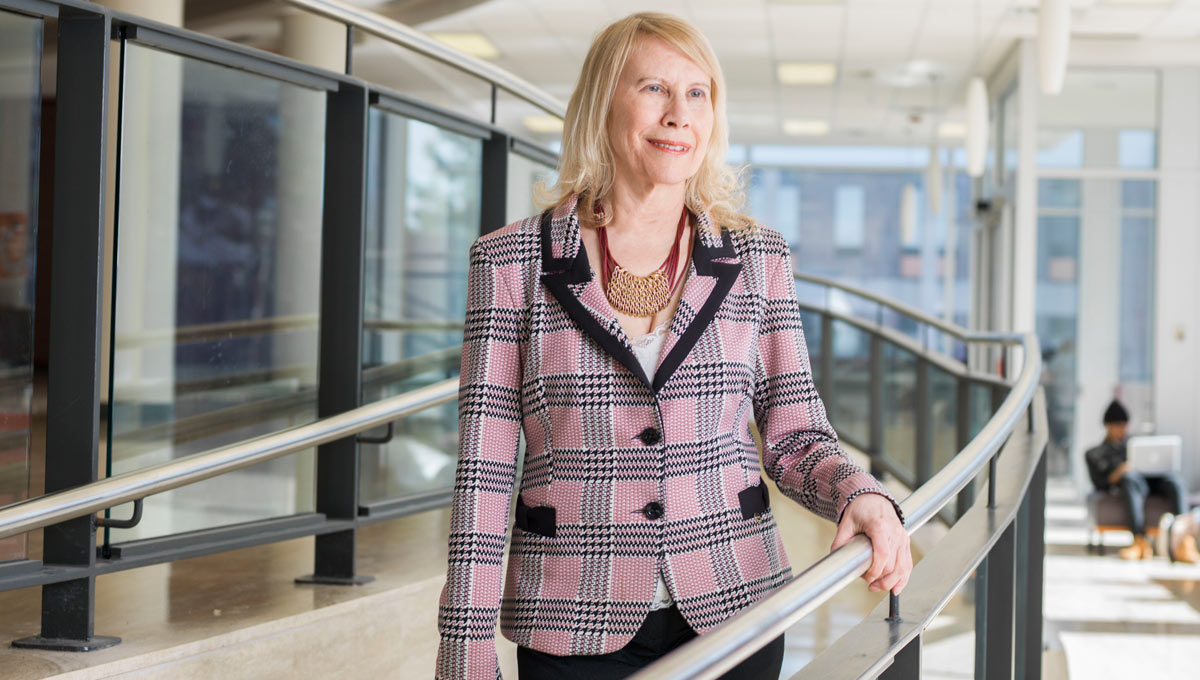
Clare Beckton, executive director of Carleton’s Centre for Women in Politics and Public Leadership (CWPPL)
“It made a lot of sense to partner with CREWW,” says Clare Beckton, executive director of the CWPPL, which promotes the equitable representation of women in democratic institutions at all levels of government and in all positions of leadership within the public, private and non-profit sectors. “We want this to be sustainable in the long run, and to build on the strengths of each centre.”
Beckton, who established the CWPPL in 2010 after leaving her position as the Agency Head of Status of Women Canada, says there wasn’t really much of a focus on female leadership at the time. “Progress had stalled. There was a view among many that equality had been achieved. But there was — and still is — a lot of work to do.”
In some industries, such as mining and construction, women are nowhere near 40 to 60 per cent representation in leadership roles. “One of the things that drives women into specific professions is when they have role models at the senior level,” says Beckton. “More women in an organization changes its culture, and makes it more inclusive to all forms of diversity.”
One of the CWPPL’s main offerings is its twice-a-year, week-long Advancing Women in Leadership Program (AWLP), which “focuses on the inner journey of authentic, creative and ethical leadership required by women to succeed in business, government and civil society. The program helps women at the mid-point in their careers to acquire new insights, organizational knowledge, and the skills required to navigate key decision-making structures and to lead change.”
Like CREWW, the CWPPL also conducts research, working with partners to release reports such as “A Force to Reckon With: Women, Entrepreneurship and Risk” and “Women’s Leadership Matters: The Impact Of Women’s Leadership in the Canadian Federal Public Service.”
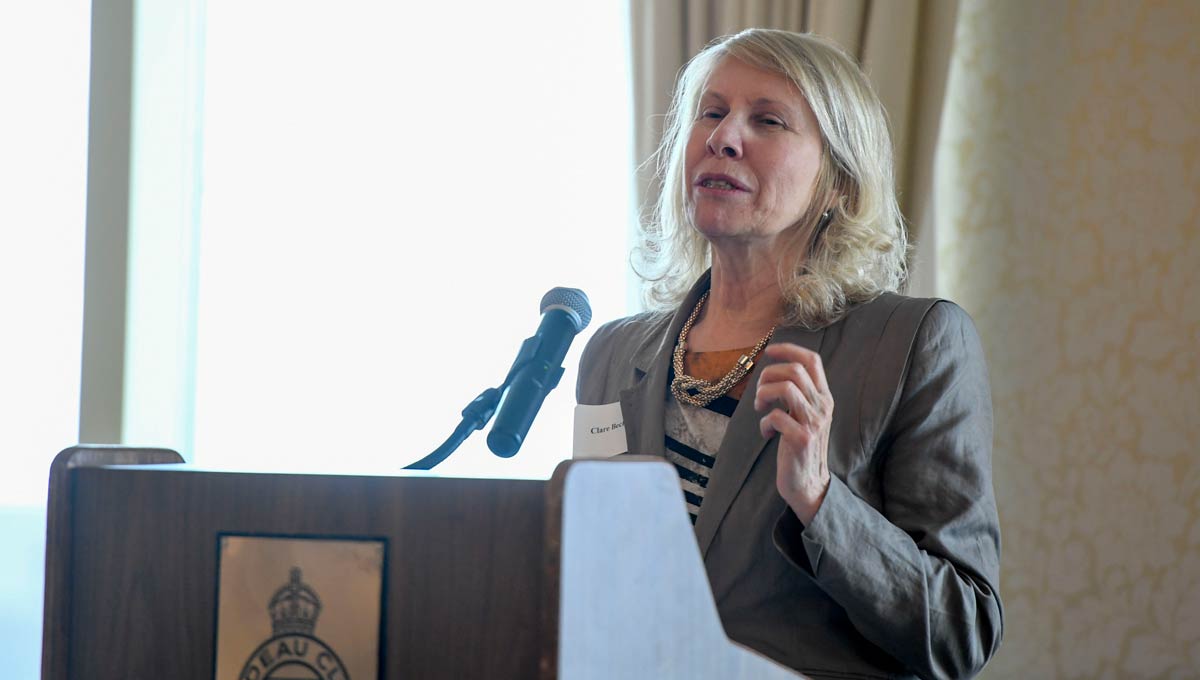
Beckton delivers a speech at the CREWW 25th Anniversary Celebration
All of this research is outward focused and open access, and it has an impact, says Beckton. The “Force to Reckon With” study, for example, helped convince the Bank of Montreal to change its approach to supporting female entrepreneurs.
Most gratifying for Beckton, however, are the comments she hears from AWLP alumni:
“This changed my life, it made me more confident, I applied for and got a promotion, I started to speak up at meetings.”
Dyke agrees. “The most important thing is that the management development program for women has provided significant career development for more than 600 women over the last 25 years,” she says.
But she’s not ready to sit back and rest on past accomplishments. As research shows, there’s a prevailing and pervasive belief that women and men have different traits, and that male traits are more congruent with management.
“These attitudes have not changed over time,” says Dyke. “We still see managers as male. We need to legitimize the fact that women can be ‘bossy.’ Especially for high school girls, being called ‘bossy’ is a criticism, a slur. We need to change that.
“Twenty-five years ago, there was a focus on gender diversity. That got lost for a while amongst more general concerns about diversity. Now it’s back on the agenda.”
